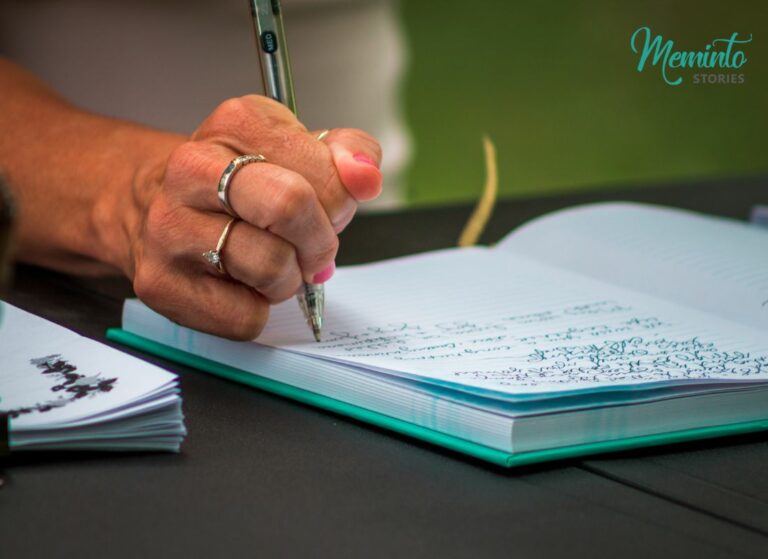Prayer isn’t just spoken; it’s written, reflected, and remembered. You know that feeling when you’re rushing through your morning routine and realize you started praying but never actually finished? Your mind wandered to the grocery list, or the kids interrupted, or you simply got distracted by the million things pulling at your attention.
Most of us want a deeper connection with God, but our prayers often feel scattered and incomplete. We have the best intentions, but between work, family, and everything else, those sacred moments slip away before we can truly settle into them.
A prayer journal for women helps you with that. It turns those crazy moments into meaningful situations and creates a beautiful record of your spiritual growth that you can revisit again and again.
This guide will cover 10 powerful women’s prayer journal prompts that will help you build a consistent prayer habit and deepen your faith journey.
Why prayer journaling transforms your faith life
Writing down your prayers gives you a different feeling. Unlike spoken prayers that fade into memory, written prayers create a real connection between your heart and God’s response.
I discovered this during one of the hardest seasons of my life when spoken prayers felt like they were bouncing off the ceiling. Writing them down changed everything. Once you write your prayers, you slow down and become more intentional with your words rather than rushing through a mental checklist or getting distracted by everything around you.
- It makes you more honest
Writing about that job situation that’s keeping you up at night leads to admitting fears you hadn’t even acknowledged out loud. Privacy of a journal invites complete honesty where you stop trying to sound spiritual and start being real about your struggles, your doubts, even your anger.
I remember writing about being furious with God for not fixing the issues I was facing and after penning that down, I felt shocked that I’d put those words on paper. Some might say it was wrong but that raw honesty helped me create more closeness with God than any polished prayer could ever do. Once you quit trying to perform spirituality and start being real, you’ll see your relationship with Him changes completely.
- It shows you how you’re growing spiritually
Six months from now, you’ll flip back through old entries and be amazed. The crisis that felt overwhelming shows how God carried you through it. Those prayers you thought went unanswered were answered in ways you didn’t expect. Your journal becomes proof of God’s faithfulness.
I still have journals from years ago where I was desperately praying about situations that seem so small now. Reading them reminds me how big those problems felt at the time and how faithfully God walked me through each one.
- It helps you see answered prayers
Without a written record, it’s easy to forget. Read last month’s desperate prayer about your daughter’s friendship struggles alongside this week’s entry about her new best friend, and you’ll see God’s hand becoming clearer to you. Your journal goes from being a collection of requests to becoming proof of His provision.
This happened to me when I was praying for months about a work situation that felt impossible. When I finally got the breakthrough, I almost forgot how long I’d been asking for it until I read my old entries and saw that God’s timing was perfect.
Common prayer struggles every woman faces
Even the most faithful women wrestle with prayer. This isn’t a sign of weak faith, but simply part of being human in a world that never stops demanding our attention.
- Inconsistency becomes the norm.
This one’s embarrassing to admit, but I’m terrible at consistency. Like, really terrible.
You start Monday morning with good intentions, but by Wednesday, your prayer time has already been pushed aside by school pick-ups, work deadlines, and the endless stream of daily responsibilities. One missed day turns into three, then a week, and suddenly you’re starting over again with the same guilt cycle.
My wife laughs because I’ll get all excited about a new prayer routine and she’ll find my journal three weeks later buried under a pile of bills on the kitchen counter. “How’s that daily prayer thing going?” she’ll ask with that look. You know the one.
- Distractions take over every quiet moment.
Sitting down to pray seems simple enough until you immediately remember the laundry in the washer, the email you forgot to send, or the grocery list that’s still half-finished. Your mind bounces from one thought to another, making it nearly impossible to focus on God when everything else feels urgent.
The moment I try to be still, my brain turns into a to-do list. Most times, right after work, I help my wife around the house and get so busy that I forget about talking to God. It’s like my mind refuses to be quiet for more than thirty seconds.
- Doubt creeps in about being heard.
I went through a season where I prayed about the same relationship conflict for almost a year with no visible change. My sister and I had this ongoing tension that was affecting our whole family, and I prayed about it constantly.
After praying about the same struggles for months without seeing change, you start wondering if your prayers matter. The silence feels heavy, and you begin questioning whether God really cares about your specific concerns or if you’re just talking to yourself.
Nothing seemed to improve, so I started wondering if God was even listening or if my problems were too small for His attention. The doubt made praying feel pointless, which only made everything worse.
- Guilt builds around forgotten prayers
My neighbor asked me to pray for her mom’s surgery just last week, and I completely forgot until she mentioned her mom was doing well afterward. You promise to pray for your friend’s job interview, but completely forget until she texts you the results. The shame of letting people down in prayer creates an additional layer of spiritual pressure, making it even harder to approach God.
This one hits me differently because you want to be the friend who follows through, but life gets busy and you genuinely forget. I felt like a terrible Christian and a bad friend all at once. The shame makes it harder to pray the next time because you’re carrying all this guilt about your prayer failures.
Using a women’s prayer journal or a daily prayer journal can help you keep track of these prayer requests, but even then, we’re all human and sometimes forget.
10 prayer journal prompts for women
These women’s prayer journal prompts will move you beyond surface-level prayers into more meaningful conversations with God. Use them as starting points, but let your heart guide where the conversation goes.
- What am I surrendering this week?
Writing down what you’re trying to control and then crossing it out as you hand it over to God feels freeing. Writing “I surrender my need to fix this” about your choices can bring immediate relief to your heart if you were feeling anxious before.
It could be your teenager’s choices, your husband’s job stress, or that relationship conflict you keep replaying in your mind. Give a name to what you’re holding onto tightly and you’d be creating a space for God to work in ways you never could.
- Write a letter to God about what you’re afraid to say aloud
Some thoughts feel too raw, too angry, or too shameful to speak out loud, even in prayer. God already knows what’s in your heart. I remember the first time I wrote “Dear God, I’m furious that you’re not answering my prayers” and felt both terrified and relieved to put those words on paper.
Writing honest letters, like “I’m terrified I’m failing as a mother,” or expressing anger about unanswered prayers, breaks down the walls we build around our real emotions. These honest letters often become the most powerful prayers because they come from the most real part of who you are.
- Record a prayer for someone else’s breakthrough
When stuck drowning in your problems, praying for someone else’s miracle feels wrong. But beautiful things happen when you write out detailed prayers for your friend’s marriage, your coworker’s healing, or your neighbor’s financial stress.
Doing this will change your perspective on your situation and remind you that God is working in multiple lives at once, not just yours.
- Where do I need God’s clarity right now?
Decision paralysis is real, especially when you’re weighing choices that affect your family. Should you take that job offer? How do you handle your aging parents’ care? I spent weeks worrying over whether to move my kids to a different school district until I finally wrote out all my confusion and asked God directly for wisdom.
Writing out your confusion and asking for God’s wisdom makes room for clarity to come. Often, the answer doesn’t come right away, but writing the question helps you listen more carefully for God’s guidance in the days that follow.
- What is God teaching me through this challenging season?
Pain without purpose feels awful. The moment you start looking for God’s lessons in your struggle with your marriage, your health scare, or your money stress, the suffering begins to make sense.
During a really difficult financial season, I started writing about what I was learning instead of just complaining about what was happening. I discovered patience I didn’t know I had and realized how much I’d been trusting in my own security instead of God’s care. Writing about what you’re learning changes you from a victim of circumstances into a student of God’s character.
- How have I seen God’s faithfulness this month?
Memory fades, especially when new problems arise. But write down how God provided that unexpected check right when bills were due, how he gave you peace during your child’s surgery, or how he opened doors you thought were closed forever, you’re building a record of his faithfulness.
I keep a running list of these moments in my daily prayer journal because I forget them so easily when new problems come up. These written reminders become anchors during future storms when doubt tries to creep in.
- What lies am I believing about myself that God wants to replace with truth?
The voice in your head telling you you’re not enough, too much, or completely behind in life gets louder during stressful seasons. I had to write down “I’m a terrible mother” during a really hard week and then force myself to write what God says about me as a parent.
Writing down these harsh thoughts and then responding with what God says about you makes a powerful change. Seeing “I’m a terrible mother” crossed out and replaced with “God chose me specifically for these children” changes how you walk through your days.
- Write out a prayer of protection for your family
Worry about your family’s safety can eat up your thoughts, especially late at night. Instead of lying awake, anxious about car accidents, peer pressure, or health concerns, channel that protective instinct into written prayers.
I do this whenever my anxiety about my kids’ safety starts spiraling. My wife and I both struggle with this as we always worry about our kids. Ask God to guard their hearts, guide their steps, and surround them with his angels. Writing protection over them releases the burden you were never meant to carry alone.
- What dream or calling is God stirring in my heart?
You know that persistent idea about starting the nonprofit, going back to school, or writing the book that keeps coming back to you? It deserves more than passing thoughts. Take a moment to write about the dreams that won’t leave you alone, patterns start to show up.
I had an idea for a community project that kept coming back to me for months. My wife would catch me daydreaming about it during dinner conversations. When I finally wrote about it, I started to see how my experiences, passions, and skills might be pointing toward something specific that God has in mind. Even if the whole picture isn’t clear, writing about it helps you take the next small step.
- How can I love others the way God loves me this week?
Love becomes real when it has hands and feet. Writing about specific ways to show God’s love makes it solid rather than just an idea. It could be bringing dinner to the overwhelmed mom down the street, listening without judgment to your friend’s struggles, or choosing patience over irritation with your family.
I write down three specific ways I can show love each week in my faith journal for women, because otherwise it stays a nice idea that never actually happens. When love moves from feeling to action, it changes both you and the people around you. Whether you use a regular notebook or a bible study journal for women with structured prompts, having a place to record these intentions makes them more likely to become reality.
What changes when prayer becomes a written conversation
When prayer moves from your thoughts to the page, something changes in the rhythm of your relationship with God. Written prayers slow you down in the best possible way, creating space for depth that rushed mental prayers rarely allow.
1. Greater emotional clarity comes naturally
Writing forces you to put words to feelings you might struggle to name otherwise. All those overwhelming feelings of stress, sadness, and frustration become specific when you have to put words to them.
I experienced this during a really tough time at work when my boss kept passing me over for projects I knew I could handle. I sat down to write what I thought would be a quick prayer about being “stressed about my job” and ended up filling two pages. As I wrote, I realized I wasn’t just stressed about the workload. I was feeling undervalued, overlooked for promotions, and questioning whether I was in the right career.
You might start writing about feeling “upset” and realize halfway through that you’re feeling betrayed, overlooked, or simply exhausted. This clarity helps you pray more specifically and understand your own heart better.
2. Faith grows deeper over time
Seeing your prayers on paper makes the conversation feel more real and intentional. You’re not just thinking about God; you’re actively engaging with him through written words.
I used to pray quick mental prayers while folding laundry or driving to work, but they felt shallow. When I started writing my prayers in my women’s prayer journal, I found myself naturally sharing more details, asking deeper questions, even admitting things I was embarrassed to say out loud. Last week, I wrote “God, I’m jealous of my friend’s new house” which is not something I would ever say out loud but needed to get out of my heart.
Most women find they naturally start writing longer prayers when they have a pen in hand rather than racing through mental checklists.
3. Prayer patterns become visible
Written prayers show trends you might not notice otherwise. You start seeing that you pray about the same concerns every Tuesday, or your prayers change during certain seasons of life.
Looking back through my daily prayer journal, I noticed that I always pray more about my children in late August, just before school starts. My financial worries peak every January, following the Christmas expenses.
My wife noticed something different because her prayers get more desperate on Sundays, because that’s when she starts thinking about the week ahead and all the things that could go wrong. These patterns help you understand your spiritual rhythms and recognize where God has been working, even when individual prayers may have felt unanswered.
4. Focus stays stronger naturally
Writing makes a different kind of concentration. Your mind can’t wander as easily when your hand is moving across the page.
Before I started writing my prayers, I’d begin talking to God and somehow end up mentally planning dinner or remembering I needed to pick up dry cleaning. Writing keeps me focused on the actual conversation.
When my mind starts to wander, my pen stops moving, and I realize I’ve drifted away from prayer. It’s like having a physical reminder to stay present.
5. Spiritual memories become treasures
Months later, you’ll flip back through old entries and discover prayers you’d forgotten entirely. You’ll see the desperation you felt during your child’s illness, followed pages later by gratitude for their recovery.
I have entries from last year where I was desperately praying about a family conflict with my sister that was keeping me up at night. We hadn’t spoken in months over something that seemed huge at the time.
Later, I find prayers of gratitude for how we worked things out during a random phone call, where we both just started laughing about how stubborn we’d been. Without those written records in my faith journal for women, I would have completely forgotten how God worked through this tough season.
Whether you use a regular notebook or a structured bible study journal for women, these written memories preserve spiritual milestones that would otherwise fade from memory.
Creating a prayer routine that actually works
The key to a prayer routine that sticks isn’t perfection; it’s finding something that fits your actual life, not the life you think you should have.
1. Start ridiculously small
I learned this lesson the hard way after failing at ambitious prayer goals more times than I can count.
Instead of committing to hour-long sessions you’ll inevitably skip, begin with five minutes of writing by setting your coffee cup down, grabbing a pen, and writing one prayer before the day officially starts.
Maria from Germany started by documenting her life story in small pieces, answering just a few questions at a time, and eventually made over 300 pages across two volumes. A five-minute habit you actually do beats a thirty-minute plan you abandon by week two.
2. Connect prayer to existing habits
Your prayer journaling should be tied to something you already do every day, such as writing while your coffee brews, during your lunch break, or immediately after putting the kids to bed.
I tried so many times to create a separate “prayer time,” and it never worked. I’d set my alarm fifteen minutes earlier, but then I’d just lay in bed thinking about my to-do list.
When I started writing prayers while waiting for my coffee to finish brewing, it stuck because I was already standing there anyway. Prayer becomes much easier when it’s part of something you’re already doing rather than another item on your to-do list.
3. Keep supplies accessible
The moment you have to hunt for a pen or remember where you put your journal is the moment you’ll skip prayer altogether, so keep your women’s prayer journal and a reliable pen in the same spot every day.
I keep mine right next to the coffee maker because that’s where I am every morning anyway. My wife tried keeping hers on her nightstand, but she’d forget to bring a pen upstairs. Some women use their phones with digital tools that have guided prompts so their daily prayer journal is always available. The key is removing any excuse between wanting to pray and doing it.
4. Don’t worry about perfect timing
Your prayer routine doesn’t have to happen at the same time every day because life with children, work demands, and unexpected situations means you need flexibility. The goal is consistency over time, not rigid scheduling.
If mornings don’t work, try evenings, and if weekdays are chaotic, focus on weekends. My wife is not a morning person, so she writes her prayers right after dinner while I’m doing dishes. I’ve learned to stop forcing myself into someone else’s ideal schedule and find what works with my life rhythm.
5. Use guided prompts when you’re stuck.
Sometimes, the words won’t come easily, and having a structure helps during these moments. My wife discovered that answering one thoughtful question at a time helped her develop a consistent prayer journal habit while making the process enjoyable rather than stressful. She’ll flip through her faith journal for women when she’s having one of those “I don’t know what to pray about” days.
Prayer prompts work the same way by giving you direction when your mind feels blank while still leaving room for your thoughts to come up. Whether you create your questions or use guided systems like a Bible study journal for women, prompts turn blank page paralysis into actual conversation with God.
Begin your prayer journal today
Prayer doesn’t have to feel rushed or incomplete anymore. The prompts you’ve read aren’t just ideas to consider someday; they’re tools you can use starting tonight.
Pick the one prompt that spoke to you most and write for just five minutes. You don’t need perfect conditions or expensive supplies, just a willingness to slow down and let your heart speak honestly to God.
My wife started her own women’s prayer journal on a random Tuesday evening with a regular notebook and a pen she found in our kitchen drawer. Nothing fancy, nothing perfect, just her and her messy thoughts finally finding their way onto paper.
Women who’ve discovered written prayer often say they wish they’d started sooner. Your spiritual journey deserves to be captured and treasured, and it begins with putting the first word on the page. Don’t wait for the perfect daily prayer journal or the ideal quiet space. Start where you are, with what you have, right now.
Whether you use a simple notebook, a structured faith journal for women, or even a Bible study journal for women with guided prompts, the important thing is just getting started. Your relationship with God is waiting to grow deeper, and it starts with that first honest prayer written down tonight.
Ready to start your prayer journal for women? Get our free printable with 30+ spiritual journal prompts to strengthen your faith journey even further.

















